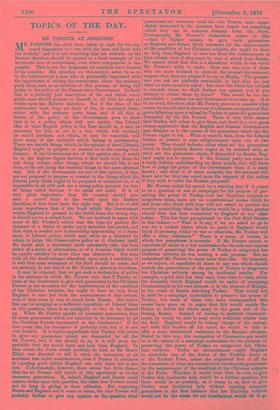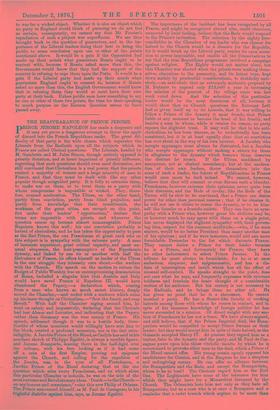TOPICS OF THE DAY.
MR. FORSTER AT ABERDEEN.
l‘IR. FORSTER has often been taken to task for his sup- 1 posed disposition to " run with the hare and hunt with the hounds," and it is not surprising that his attitude on the
Eastern Question should be quoted as a fresh example of his inveterate love of compromise, even where compromise is im- possible. This is not the judgment we ourselves have formed of his position. His speeches on this subject seem to us to be the utterances of a man who is profoundly impressed with
the importance of raising the controversy above the ordinary party lines, and, as an incident of this process, of doing full justice to the policy of the Conservative Government. In itself this is a perfectly just description of the end which every public man should propose to himself in all that he says or writes upon the Eastern Question. But if the lines of the controversy tend, from no fault of his, to confound them- selves with the ordinary party lines, and if all that is known of the policy of the Government goes to show that it is a policy which will not satisfy the Liberal idea of what English policy in the East should be, it may be necessary for him to act in a way which will certainly be called partisan, and which, it may be conceded, will have many of the incidents which belong to partisanship. There are certain things which, in the opinion of most Liberals, England ought to propose or consent to in the coming Con- ference. If the Government are of this opinion also, it would be in the highest degree factious to find fault with them for not doing certain other things which we should like to see done, or for not doing the essential things in the most effectual way. But if the Government are not of this opinion, if they are not prepared to propose or consent to the things which the Liberal party think ought to be proposed or consented to, it is impossible to sit still and see a wrong policy pursued for fear of being called factious if we speak our mind. It is of very great importance that the country should pre- sent a united front to the world upon the Eastern Question, if that front faces the right way. But it is of still more importance that if the front which the Government wishes England to present to the world faces the wrong way, it should not be a united front. We are inclined to agree with some of Mr. Forster's critics that the time for general dis- claimers of a desire to make party speeches has passed, and that what is needed now is something approaching to a state- ment of Liberal policy, which may serve as a standard by which to judge the Conservative policy as it discloses itself. No doubt such a statement must necessarily take the form either of a series of alternatives, or of a formula which would be equally satisfied by more than one alternative. But even with all the disadvantages attendant upon such a condition, it is well that some statement of the kind should be made, and we certainly do not find it in Mr. Forster's speech at Aberdeen.
It may be objected, that we get such a declaration of policy in the sentence in which Mr. Forster says that if Turkey re- fuses at the Conference to give such guarantees to the Christian Powers as are necessary for the improvement of the condition of her Christian subjects, she ought to have no help from England to save her from the consequences of that refusal, even if they come by way of attack from Russia. But before this can be accepted as a sufficient exposition of Liberal ideas on this question, there is an ambiguity or two to be cleared up. When Mr. Forster speaks of necessary guarantees, does he mean guarantees which are admitted to be necessary by all the Christian Powers represented at the Conference ? If he does mean this, his statement is perfectly true, but it is not very fruitful. It is highly improbable that Turkey will refuse to give any guarantees which are demanded by all the six Powers, and if she should do so, it is still more im- probable that she would have any help from England. In that event, the Porte would probably be told, as Sir Henry Elliot was directed to tell it when the concession of an armistice was under consideration, that if Turkey is obstinate in rejecting good advice England can only leave her to her fate. Unfortunately, however, there seems but little chance that the six Powers will arrive at this agreement as to the necessary guarantees. If, indeed, England and Russia could come to terms upon this question, the other four Powers would not be long in giving in their adhesion. But supposing Russia and England not to come to terms, the four Powers will probably decline to give any opinion on the question what guarantees are necessary until the two Powers most imme- diately interested in the question have found out something which they can in common demand from the Porte. Consequently Mr. Forster's declaration comes to this —that if Turkey refuses to give such guarantees as England and Russia think necessary for the improvement of the condition of her Christian subjects, she ought to have no help from England to save her from the consequences of that refusal, even if they come by way of attack from Russia. We cannot think that this is a statement which it was worth Mr. Forster's while to make. Does any one, even of those who are most inclined to distrust the present Government, suppose that they are prepared to say to Russia, " The guaran- tees you ask are perfectly reasonable, in fact, they are just what we have ourselves asked ; but since the Porte has refused to concede them, we shall declare war against you if you attempt to obtain them by force?" This would be too im- practicable a position for any Government to to take up. It is of no avail, therefore, that Mr. Forster goes on to consider what course we should take in the event of a Russian occupation of Bul- garia following upon a refusal by Turkey to grant the guarantees demanded by the Six Powers. There is very little chance that Turkey will refuse to give them, and there is a very great chance apparently that the English and Russian Governments may disagree as to the nature of the guarantees which the Six Powers ought to ask. What is wanted, then, from the Liberal leaders at present is some enlightenment upon one of two points. They should indicate either what are the guarantees which in their opinion Russia ought to be satisfied with, or what are the guarantees which, if demanded by Russia, Eng- land ought not to oppose. If the Liberal party can come to a fairly definite understanding on these points, they will know how to judge the policy of the Government when it is made known ; and what is of more moment, the Government will know how far they can count upon the support of the nation if they wish to resist the Russian proposals.
Mr. Forster ended his speech by a warning that if it comes to be a question of war or campaigns for the purpose of pre- serving the power of Turkey over her Christian subjects to misgovern them, there are no constitutional means which he and those who think with him will not resort to prevent the country committing what he believes would be a crime greater almost than has been committed by England or any other nation. This has been paraphrased by the Pall Mall Gazette in this fashion :—" That is to say, if we are asked to go to- war for a wicked object which no party in England would think of pursuing, either by war or otherwise, Mr. Forster will offer a stern resistance." There is a sense, of course, in which this paraphrase is accurate. If Mr. Forster meant to repudiate all share in a war undertaken for the sole and express purpose of preserving the power of Turkey to misgovern her Christian subjects, he was making a safe promise. But we understand Mr. Forster to mean more than this. He intended, as we believe, to repudiate all share in any war which should. include the preservation of the power of Turkey to misgovern her Christian subjects among its incidental results. For example, a good deal has been said, from time to time, about the necessity which England would be under of occupying Constantinople in her own interest or in the interest of Europe, in the event of Russia attacking Turkey. That would not in itself be a campaign undertaken to preserve the power of Turkey, but some of those who have recommended this course have gone on to argue that this would enable the Sultan to devote his whole army to the great end of de- feating Russia. Instead of having to garrison Constanti- nople, be would be able to send every available soldier into the field. England would be taking charge of his capital, and with this burden off his mind, he would be able to offer a more determined resistance to the Russian advance. Stated in this way, the occupation of Constantinople would be in the nature of a campaign undertaken for the purpose of preserving the power of Turkey to misgovern her Chris- tian subjects. Under no circumstances ought England to undertake any of the duties of the Turkish Army or of the Turkish Fleet, unless she stipulated first of all for the concession of what she considered to be adequate guarantees for the improvement of the condition of the Christian subjects of the Porte. Whether it would even then be wise to give Turkey this incidental help would be a further question, but there would be no question, as it seems to us, that to give Turkey even incidental help without exacting adequate guarantees in the first instance that her Christian subjects would not be the worse for our interference, would be to go
to war for a wicked object. Whether it is also an object which no party in England would think of pursuing we do not feel so certain, consequently, we cannot say that Mr. Forster's repudiation of such a project was superfluous. We are thus brought back to the question of guarantees, and to the im- portance of the Liberal leaders doing their best to bring the public to some conclusion upon one or other of the points mentioned above. It would be a gain if the Opposition had made up their minds what guarantees Russia ought to be content with, because if Russia asked more than this, the Government would know that they had the support of the country in refusing to urge them upon the Porte. It would be a gain if the Liberal party had made up their minds what guarantees England ought to consent to, because if Russia asked no more than this, the English Government would know that in refusing them they would at most have their own party at their back. 'Unless public men have something to say on one or other of these two points, the time for their speaking to much purpose on the Eastern Question seems to have passed away.



































 Previous page
Previous page